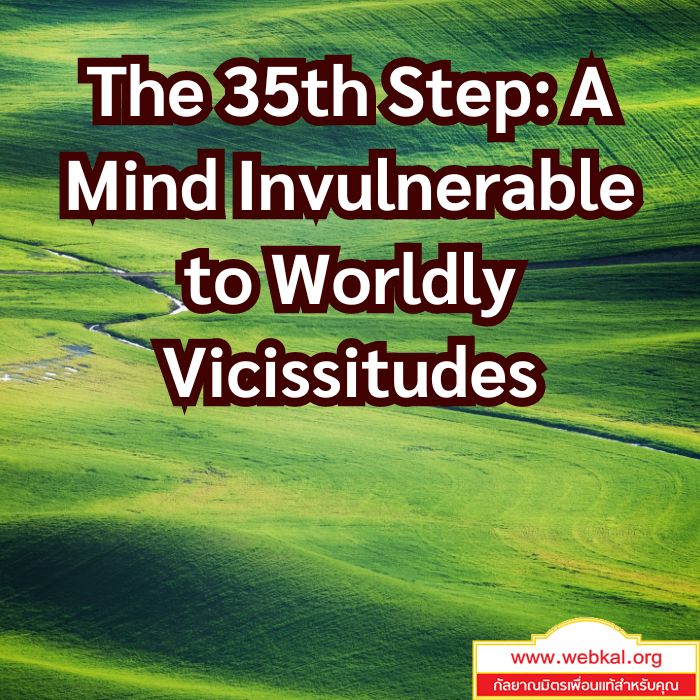
The 35th Step: A Mind Invulnerable to Worldly Vicissitudes
The mind is the nature of thought inside our body and can collect and assimilate all kinds of mental sense objects.
Vulnerability means being worried, being apprehensive regarding undesirable consequences. On the other hand, it can be translated as desires and wishes for desirable consequences. It can be deduced that one's mind is affected in either of the two ways mentioned, and thus, it is vulnerable.
Vicissitudes of the world are features of life in the world which are fraught with uncertainty and changes, and no one can avoid them for as long as they live in the world.
A mind invulnerable to worldly vicissitudes means the quality of the mind that is not affected by the fluctuations, desirable or undesirable consequences. Themind establishes equanimity and mindfulness properly. In brief, one knows the ways of the world or norms of the world.
Worldly vicissitudes (The Eight of Loka-Dhamma) can be divided into two groups.
1) The first group of desirable vicissitudes which can make the mind elated is consisted of gain, repute, praise, and happiness. These four worldly vicissitudes are pleasant, favorable, and desirable to ordinary people without knowing their ever-changing conditions in life within the world. As a result, people go in search of them. Once they have achieved them, they become possessive and scared that they will lose them.
2) The second group of undesirable vicissitudes is consisted of loss, dispute, blame, and suffering. These four worldly vicissitudes are unpleasant, unfavorable, and undesirable to ordinary people. They are afraid of facing them. Or some have encountered them, and are afraid of the bad consequences which may occur. Although some have experienced, through hardship, these undesirable vicissitudes, they are still vulnerable because of the ability of the vicissitudes to reoccur.
Nevertheless, the Eight of Loka-Dhamma includes all things in the world comprising the "Three Universal Characteristics" (Tilakkhana) which are:
1) Impermanence (aniccatā). All conditioned states are impermanent regardless of whether they are occupied by spirit or not. Everything is in a flux; there is degradation and deterioration built into everything around us.
2) Suffering (dukkhatā). Things decay as is their nature. All living beings have to die. Nothing prolongs eternally.
3) Not-Self (anattatā). Not being able to find the true self of anything. Nothing in the world has implicit identity, everything is uncontrollable and discontented.
Not knowing the "Three Universal Characteristics" can cause people to become infatuated with worldly vicissitudes, become vulnerable to them, and are eventually drawn into misery. The noble ones see Dhammakāya inside which is composed of Permanence (niccatā), Happiness (sukkhatā), and True-self (attatā), all of which are beyond the Three Characteristics. They are the characteristics of Nirvana. As a result, the noble ones are invulnerable to worldly vicissitudes, not infatuate with them, but focus and touch their minds upon Nirvana as a state of mind inside the body at all times.
The eight types of worldly vicissitudes are inevitable to all; however, the enlightened ones are aware of this timeless truth. Even though they are in face of them, they are invulnerable. They know their nature or the Three Universal Characteristics as follows.
1) Impermanence (aniccatā). All conditioned states consist of impermanence and instability.
2) Suffering (dukkhatā). Things have decay as their nature. All living beings have to die sooner or later. Nothing can prolong eternally.
3) Not-self (anattatā). Nothing in the world has implicit identity and is uncontrollable and discontented.
All three mentioned are opposite to Nirvana which is permanence, happiness, and true self.
However, there is a sort of suffering which is avoidable - but ironically, people tend to seek this kind of suffering because it is so desirable to them. They become like a fish baited to a hook, they become possessive of this object. They find it refreshing and delightful, but it only leads to the conditions of the Three Characteristics; impermanence, suffering, and not-self. Consequently, when it is gone, the owner's mind becomes dry or sorrowful. This sort of suffering refers to love. On the contrary, the enlightened ones are beyond the worldly conditions, they pay it no attention. Therefore, they do not become dry, and sorrowful, nothing and no one can cause them sorrow regarding the possession of love.¹ They do not need to nor feel love for anything, except for their love of Nirvana.
Hence, the eight types of worldly vicissitudes are inevitable for all; no matter if they are ordinary persons or noble ones. The only difference between them is that the mind of the ordinary persons is vulnerable to worldly vicissitudes because of their ignorance. The mind of the noble ones is invulnerable to the worldly vicissitudes because they are aware of these truths.